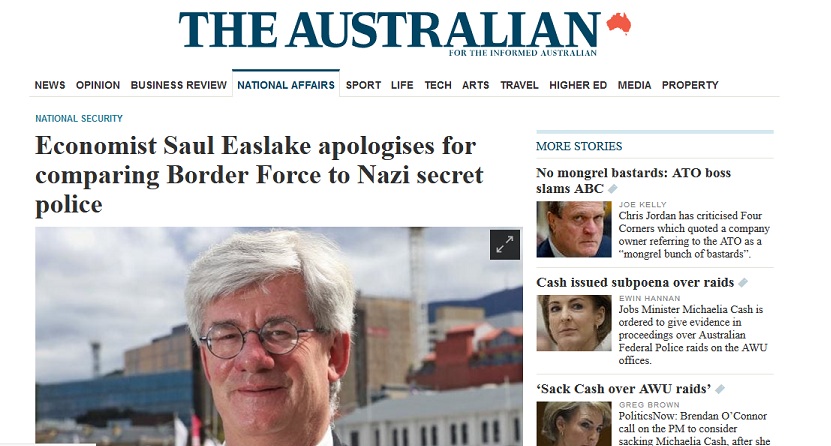
Richard Ferguson
An economist has been forced to apologise to Holocaust survivors after he linked proposed powers for the Australian Border Force to those of the Nazi secret police.
Saul Eslake came under scrutiny from the Jewish community after he linked the federal government’s plan to allow officials to stop and check people’s identification in airports to the crimes of the Gestapo, during an interview with The Saturday Paper.
Mr Eslake, a former chief economist for ANZ and Merrill Lynch’s Australian arm, is a familiar face on news programs and a respected fiscal thinker.
“Malcolm Turnbull said when he became prime minister he was going to lead a thoroughly liberal government,” Mr Eslake told The Saturday Paper on May 19.
“Now he’s going to give the police the kind of stop-and-demand-ID powers that the secret police in the KGB in the Soviet Union used to have, or the Gestapo. It makes me want to puke.”
The Gestapo was largely responsible for rounding up Jews in Europe and imprisoning them in Nazi death camps in the 1930s and 40s. Six million Jews died in the Holocaust.
This latest connection of Australia’s border policies and Nazi Germany comes months after barrister Julian Burnside apologised for retweeting a photo of Peter Dutton dressed as a Nazi.
Mr Burnside, a refugee activist, apologised for any offence made by the retweet and met with a Holocaust survivor in Melbourne after pressure from the Jewish community.
Mr Eslake, in a letter to the Anti-Defamation Commission late last week, said he never intended to compare the Border Force or the Turnbull government with the Nazis. “Not for one second did it ever enter my mind that any such inference would be drawn … Nor did I have any intention of comparing the present Australian government, nor any members of it, to the Nazi regime.
“I accept that my reference to the Gestapo in this context was inappropriate, and I hereby apologise to you — and through you to any Holocaust survivors or their descendants … for it.”
Mr Eslake also noted in his letter that he has also been the target of anti-Semitic comments, because of his first name, despite the fact he is not Jewish.
Mr Eslake told The Australian he was still concerned by the government’s plans but understood why the Gestapo link had offended the Jewish community.
Anti-Defamation Commission chairman Dvir Abramovich accepted the apology and said he wanted to work with Mr Eslake to combat anti-Semitism.
“We unreservedly accept Saul Eslake’s apology which is sincere and heartfelt, as well as his acknowledgement that the Holocaust must never be trivialized,” he said.
“No matter how heated a debate is over the issues of the day, there is no comparison between contemporary political actions in Australia and the evil deeds of the Nazi police during the Holocaust.”